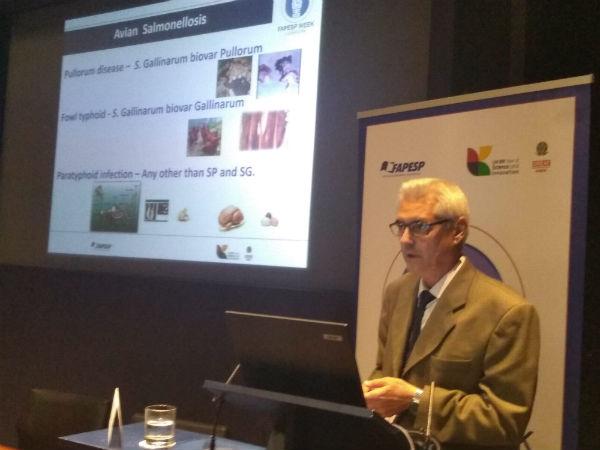Project identifies genes that allow bacteria to survive in digestive tract of poultry and infect people.
February 21, 2019

A group of researchers from the School of Agricultural & Veterinary Sciences at the State University of São Paulo (FCAV-UNESP) in Jaboticabal, Brazil, are investigating genes that are important for the survival of the bacterial species salmonella in the intestinal tract of poultry, according to an announcement from the São Paulo Research Foundation (FAPESP) in Brazil.
The goal is to prevent foodborne infections in people.
There are more than 2,600 known serotypes of salmonella, and some are responsible for many cases of infection in people and animals.
While salmonella contamination of poultry is a global issue, FAPESP reported that the presence of certain serotypes in Brazilian poultry products has caused the European Community to block poultry imports originating in Brazil. European law is quite restrictive when it comes to the presence of these bacteria, FAPESP said.
"Salmonella easily colonizes the digestive tract of poultry and may or may not cause disease. Even when they do not affect the chickens themselves, they are able to infect humans who eat the chicken," FCAV-UNESP professor Angelo Berchieri Jr. said during a recent session at FAPESP Week London, a symposium meant to strengthen research links between Brazil and the U.K.
Berchieri is responsible for a FAPESP-funded thematic project that will test the effects of deleting two genes — ttrA and pduA — from three serotypes of salmonella: Salmonella enteritidis, Salmonella typhimurium and Salmonella heidelberg.
"We selected these three serotypes because they are frequently found in poultry and may cause foodborne infections in humans," Berchieri said.
The researcher explained that of the three, S. heidelberg is the least common among people, but it was found in the Brazilian poultry shipments that were not accepted in Europe. "The serotype is widespread in Brazil and could compromise Brazilian exports," he said.
Brazilian law specifically restricts the enteritidis and typhimurium serotypes, but depending on the importing country, other salmonella serotypes in exported poultry products may come under restrictions as well, FAPESP said.
Also taking part in the project are post-doctoral research Mauro de Mesquita Souza Saraiva and biologist Gabriele Tostes Gricio.
To determine which genes cause the bacteria to become resistant to the poultry immune system, FAPESP said the researchers infected one group of chicks with a wild-type bacterium (without genetic modification) and another group with salmonella whose ttrA or pduA genes had been deleted. Then, they compared the two groups for the presence of bacteria in feces, cecum, liver and spleen.
By identifying the genes that allow the bacteria to survive, the researchers were able to generate mutant forms that may be used as a vaccine. When the immune system comes into contact with a variety that does not kill the animal but survives for a period of time, that animal establishes an immunological memory. In the event that the animal is later exposed to a harmful version of the bacteria, its defenses will be ready to attack it, FAPESP explained.
Source: FAPESP, which is solely responsible for the information provided and is wholly owned by the source. Informa Business Media and all its subsidiaries are not responsible for any of the content contained in this information asset.
You May Also Like

.png?width=300&auto=webp&quality=80&disable=upscale)

